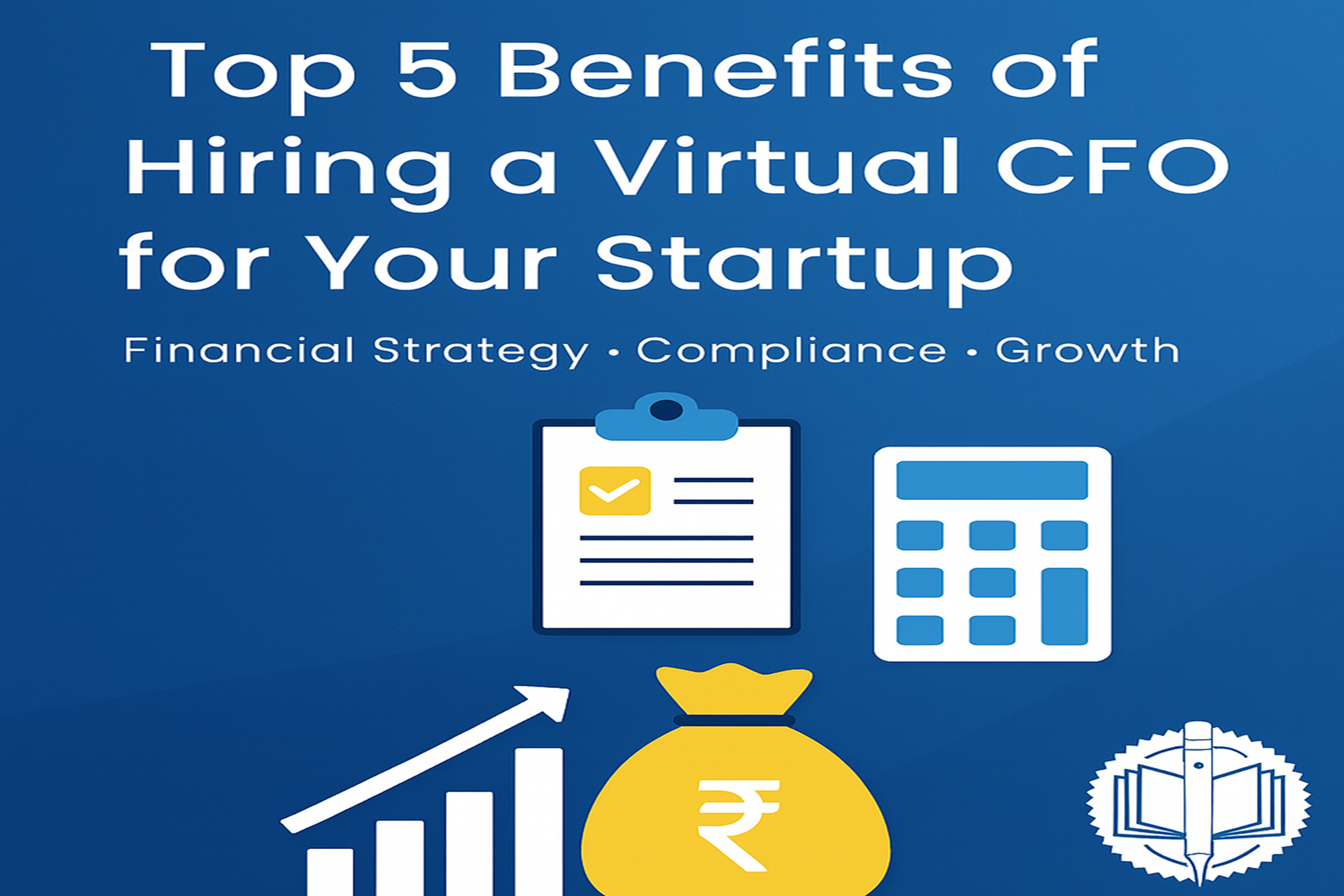🔹 Introduction
In today’s fast-paced startup ecosystem, financial discipline and strategic decision-making are key to sustainable growth. However, most startups cannot afford a full-time Chief Financial Officer (CFO) in their early stages. This is where the Virtual CFO (vCFO) model comes in — a modern, cost-effective solution offering startups the same expertise as a full-time CFO, but on a flexible, part-time, or project basis.
A Virtual CFO is not just an accountant; they are your strategic financial partner, helping with budgeting, cash flow forecasting, compliance, investor relations, and profitability analysis. This article explores the top 5 benefits of hiring a Virtual CFO and how it can transform your startup’s financial management in 2025 and beyond.
🔹 Legal & Business Framework
A Virtual CFO operates under the same regulatory and ethical framework as traditional CFOs, guided by:
-
Companies Act, 2013 – Financial reporting and statutory compliance.
-
Income-tax Act, 1961 – Tax planning, advance tax, and TDS management.
-
GST Law (CGST & SGST Acts) – Indirect tax compliance and ITC reconciliation.
-
MCA & FEMA Regulations – For startups receiving foreign investments or operating internationally.
-
Accounting Standards (Ind AS / AS) – Ensuring accurate and compliant financial statements.
🔹 Top 5 Benefits of Hiring a Virtual CFO
✅ 1. Cost Efficiency Without Compromising Expertise
Hiring a full-time CFO can cost ₹30–60 lakhs annually — often unaffordable for startups.
A Virtual CFO offers CFO-level expertise at a fraction of the cost, allowing startups to pay only for the hours or services they actually need.
📌 Result: Professional financial guidance without adding fixed overheads.
🔹 2. Improved Cash Flow & Financial Planning
Cash flow mismanagement is one of the top reasons startups fail. A Virtual CFO helps:
-
Create accurate cash flow forecasts.
-
Manage working capital effectively.
-
Plan for future expenses and funding needs.
This proactive approach ensures liquidity and financial stability during growth phases.
📊 Example: Predicting cash shortages 3 months in advance can help a startup secure bridge financing in time.
🔹 3. Better Compliance & Tax Management
Startups often struggle with complex compliance requirements under GST, TDS, ROC, and Income Tax.
A Virtual CFO ensures:
-
Timely return filing and statutory compliance.
-
Error-free tax computation and audit coordination.
-
Implementation of efficient systems for GST reconciliation, ITC matching, and e-invoicing.
📌 Result: Reduced risk of penalties, interest, and government notices.
🔹 4. Data-Driven Decision Making
Modern Virtual CFOs leverage tools like Power BI, Zoho Books, QuickBooks, and Tally Prime to generate actionable financial insights.
They help founders answer critical questions such as:
-
Which product line is most profitable?
-
How to optimize pricing or reduce costs?
-
What’s the ROI of current marketing spend?
📈 Benefit: Decisions backed by real-time financial intelligence instead of guesswork.
🔹 5. Investor Readiness & Strategic Growth
When startups approach investors or venture capitalists, they need clear and credible financials.
A Virtual CFO helps prepare:
-
Pitch decks with financial projections.
-
Valuation models and funding strategies.
-
Due diligence-ready books of accounts.
They also guide startups in equity structuring, ESOP design, and growth forecasting — turning financial data into a compelling story for investors.
💡 Outcome: Increased investor confidence and smoother funding rounds.
🔹 Common Mistakes Without a CFO
-
❌ Relying only on accountants for strategic decisions.
-
❌ Ignoring MIS reporting or monthly cash flow reviews.
-
❌ Filing returns without financial analysis or tax planning.
-
❌ Delaying statutory payments, leading to compliance risk.
🔹 Best Practices When Engaging a Virtual CFO
✅ Choose a vCFO with industry-specific experience (tech, retail, SaaS, manufacturing, etc.).
✅ Set up a monthly review dashboard with key financial KPIs.
✅ Ensure secure cloud-based data sharing and accounting tools.
✅ Integrate financial planning with business goals and investor timelines.
✅ Conduct a quarterly strategy review with the vCFO and core team.
🔹 FAQs
Q1. What exactly does a Virtual CFO do?
➡️ A Virtual CFO provides strategic financial guidance, oversees compliance, prepares MIS reports, manages cash flow, and supports fundraising — remotely or part-time.
Q2. Is hiring a Virtual CFO cost-effective for small startups?
➡️ Yes, startups can engage a vCFO for as low as ₹30,000–₹1,00,000 per month, depending on scope — far cheaper than a full-time CFO.
Q3. Can a Virtual CFO handle investor interactions?
➡️ Absolutely. They assist in preparing financial models, business valuations, and due diligence documentation.
Q4. Is a Virtual CFO different from an accountant?
➡️ Yes. Accountants record transactions; a vCFO interprets financial data to drive growth and ensure compliance.
Q5. Can Tech-Tax Solutions provide Virtual CFO services?
➡️ Yes, our team at Tech-Tax Solutions offers Virtual CFO packages tailored for startups, SMEs, and growing enterprises.
🔹 Conclusion
For startups aiming to scale efficiently, hiring a Virtual CFO is no longer a luxury — it’s a necessity.
A Virtual CFO provides the perfect mix of strategic insight, cost control, and compliance management, helping founders focus on innovation while ensuring financial health.
📌 Whether it’s fundraising, financial strategy, or tax compliance, partnering with a Virtual CFO through Tech-Tax Solutions ensures your startup is always investor-ready and financially resilient.






